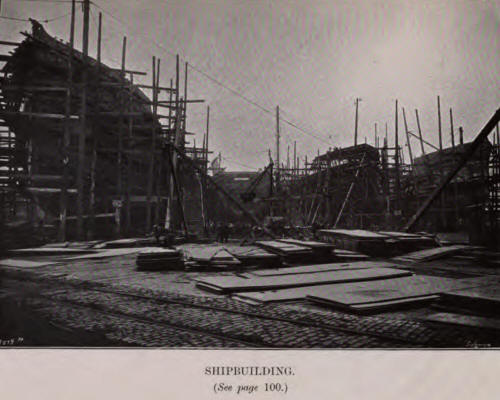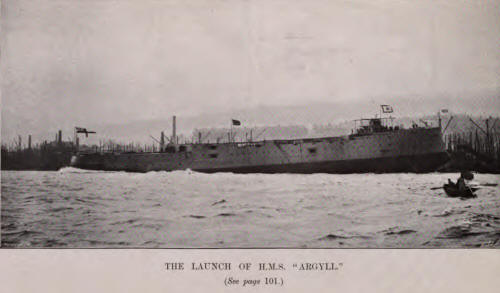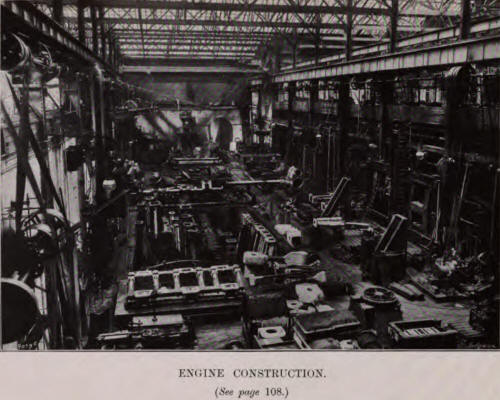|
HAVING reviewed the history of the firm, and dealt briefly with the
results obtained by some of the modern steamers constructed by them, we
propose now C to describe the Works in order to indicate the measures
adopted to secure efficiency in design and construction of all types of
ships and machinery. Organisation and administration are as important
factors towards this end as the mechanical methods and appliances adopted,
and it may be well, therefore, to deal first with these.
The firm have been responsible for the design of almost every merchant
ship constructed by them. Success has been rendered more certain by the
possession of carefully- collated records, the product of an organised
system of working up all data, of tackling new problems, of making
calculations regarding any scientific question, and of studying
contemporaneous work as described in the technical press and in papers
read at technical institutions. This continuous investigation produces a
wealth of suggestion, which enables the chiefs of the respective
departments to determine how far practice may be improved; and thus there
is steady progress not only in design but in constructional methods. A
well-selected technical library, from which the staff can borrow books,
also contributes to the same end.

Admiralty and merchant work is initiated in separate drawing-offices. The
"Printed Instructions to Draughtsmen" throws light on the general
principles which influence design, and one or two quotations may be
made:-" Every machine or structure is designed with a certain object in
view; therefore, in designing, keep that object always to the front. Go
straight to the point, and let the object be attained in as simple a
manner as possible. Avoid all curves and indirect lines, except those
conceived to give uniform strength or stiffness, or required for some
definite purpose. There should be a reason for the contour and shape of
every detail. It should be remembered that designs made in this way,
requiring least material for the work to be done, usually look best.
Besides keeping the object clearly to the front, it is necessary in
designing to remember that certain facilities must be attended to for
moulding, machining, and erecting. It is also necessary to keep in view
the circumstances in which the structure or machine is to be used. Every
little detail should be definitely attended to on the drawings, and not
left to the judgment of the men in the shops; remember that it is usually
the unexpected which happens, and that even the want of a split pin may
cause a breakdown. In making drawings or sketches for ordering material or
for the shops, assume that those who have to interpret the instructions
have no knowledge of, or information concerning, the work in question,
except what is contained in the drawing or order you are making out. This
will ensure that all information issuing from the drawing-office is
complete, and that no work is done in the shops without drawing-office
instructions."
The draughtsman, in designing work, must so arrange details as to fully
utilise, as far as is compatible with progress, the special machine tools
available, the system of gauges, templates, and jigs extensively applied
in the shops, and existing patterns. Bonuses are paid for improvements in
design whereby economy may be effected in machine operations, etc.
There is a large estimating department, where records of costs, rates,
wages, etc., are of the most complete description. The card system adopted
is admirably suited for enabling references to be made at any time as to
the cost of units in any contract. Here also it is possible, by the simple
process of comparison, to effectually check the economy of design and
manufacture, without which a high premium is placed against efficiency.
The staff in these departments is largely recruited from the shops, and
thus there is an incentive to the willing apprentice to excel. The great
majority of the vacancies in the technical staff are filled by apprentices
who have spent three and a-half years in the shops, and who are chosen as
a result of examination and of a satisfactory record in the shops.
Financial facilities are afforded to boys and to progressive workmen to
attend special classes, not only in Greenock but in Glasgow. Competitions
are instituted at intervals to encourage expertness in some branch of
work—for instance, in the use of the slide-rule, etc. Thus in many ways
the growth of an active esprit de corps is encouraged, apart altogether
from the influence which the historical and present-day success of the
firm engenders.
The same broad policy is pursued in the shops. Payment by merit to the
tradesman is adopted as far as possible. In the engine works the bonus
system—first adopted in 1902—is extensively applied. The arrangement is
satisfactory from the point of view of tradesman employer, and client.

Long experience has enabled the firm to set equitable standard times for
many operations, and there was from the beginning the guarantee that this
standard would not be altered unless entirely new machines were introduced
to greatly influence the rate of production. Now if a workman requires the
full time, or more than the time set as a standard for a job, he is still
paid his full-time wage as under the old conditions : but should he
complete the work in less than the standard time, his rate• of wage per
hour is increased in direct proportion to the saving in time; the shorter
the time taken, the greater the rate of bonus. The bonuses earned range as
a rule from 20 to 30 per cent. over the time-rate wage. To quote actual
cases, a workman who saves 26 hours on a job for which the standard time
is 134 hours, increases wage for the fortnight by 14s., while the money
saved to the employer is only 2s. 9d. He who saves 30 per cent. on the
time adds 21s. to his fortnight's wage.
Such reduction in the time taken is not attained at the expense of
efficiency; the premium job is carefully inspected, and unless it is of
the highest standard the bonus is forfeited; so that the workman is
continuously careful to avoid any risk which will result in the loss of
the reward for his extra work. The reduction in time taken is, in a large
measure, due to the exercise of foresight and ingenuity on the part of the
workman. He is ever on the alert to ensure that he will not be kept
waiting for material to enable work to progress. The machine-man makes
certain that before one unit is out of his machine the casting, forging,
or bar for the next is alongside. This is further facilitated by a man in
each shop whose only duty is to see that there is a supply of work for
every tool. Encouragement is always accorded to those who suggest
modifications to increase the output from any machine. Again, in the
erecting of engines, considerable economy has been attained, owing to
similar foresight being exercised to ensure that each unit is machined
before it is wanted by the erector, To the employer also there is gain in
the increased production, from a given number of machines and men, for a
constant establishment expenditure—rent, rates, taxes, etc. While the wage
paid to the men is increased, there is a reduction in the cost of
production, which of itself encourages capital expenditure on improved
methods and appliances. Concurrently with the adoption of the bonus system
there has been a great increase in the cutting speed of tools, which has
also augmented the rate of production. This "speeding-up" is partly due to
the fitting of new machines, to the substitution of forged steel machine-.
cut gear for cast spur - wheels, to the strengthening of lathe headstocks,
to wider belts, to the application of reversible motors to some machines,
and to quicker return speeds.

Some indication may be given of the increased economy resulting from the
bonus system and from the "speeding- up" of tools, as compared with the
former system, with slower speeds and piece-work rates. A typical job,
which had formerly occupied eighty hours, was, after experience, given a
standard time of sixty hours. When first carried out under the bonus
system the time actually taken was forty-five hours, the labour cost being
reduced from £2 13s. 4d. at piece-work rate to £1 17s. 6d. under the bonus
system, while the wage of the worker was increased by 2d. per hour.
Subsequently, a repeat of this job was machined by the same man, who,
having confidence that the time allowed would not be reduced, finished the
work in thirty - nine hours, saving twenty - one hours on the standard
time, reducing the cost to £1 15s. 0d., and increasing his rate of pay by
2.8d. per hour. Other comparisons might be given to show the advantage
over the piece-work. In successive fortnights after the introduction of
the system, the percentage of time saved on the time taken on piece-work
in one department steadily advanced from 16 per cent. to 47 per cent., and
ultimately the pay of the men per hour was increased 75 per cent., while
the saving to the employer was 50 per cent.
The client profits, as the contract price is reduced without any
diminution in the satisfactory character of the work done; indeed it is
probable that this is improved because of the special inspection to
ascertain if the bonus has been conscientiously earned. A lower contract
price, therefore, is possible; and this places the firm, both directly and
indirectly, in a better position in competition in ship-building. There is
more work obtainable, more constant employment for the workmen, with the
additional inducement of higher wages to capable and diligent men.
|

